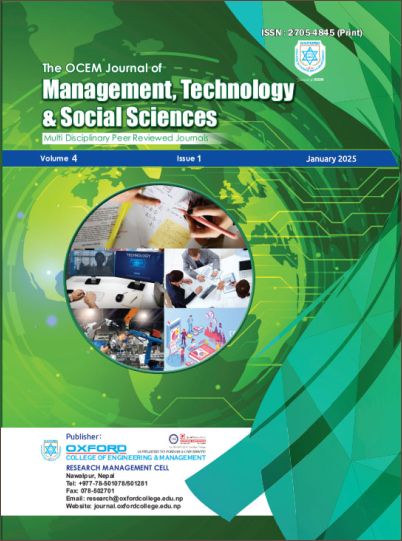Educational Leadership and Management in Complex and Diverse Situations (A Case Study of Chitwan)
DOI:
https://doi.org/10.3126/ocemjmtss.v4i1.74749Keywords:
Chitwan District, educational leadership, head teacher attrition, quantitative research, recruitment, retentionAbstract
Recruitment and retention of school headteachers are crucial parts of quality education in schools because qualified, experienced, and retained school headteachers can motivate teachers and enhance the educational standard in schools. This study examined the perceptions of the headteachers to understand their attrition causes. This paper tried to identify the causes of headteachers’ attrition by conducting qualitative interviews in Chitwan District, Nepal. This paper applied the qualitative approach because it helps understand the deeply rooted experience of headteacher attrition. Using the accounts of the five headteachers, the interviews were conducted concerning their job dissatisfaction factors (e.g., societal support), followed by open-ended interviews by conducting qualitative interviews in Chitwan District (2022).
This study considered three major ethical issues in qualitative research: the researcher’s behaviour, questionable information, suggestions, and study guidance. It is argued that due to a lack of technological access and social identity, there is always a problem with recruiting and retaining headteachers in Nepalese schools. This study argues that with respect to the day-to-day work activities required to be a headteacher, the working relationship between teaching and non-teaching staff has changed fundamentally worldwide, including in Nepal. Nepalese schools have been struggling to find stable and highly motivated headteachers. However, the investment outcomes are not as fruitful as they have been in the Nepalese schools. It has been concluded that the lack of technological access, social respect, high political pressure, the lack of motivation and lack of commitment and motivation were the key causes of headteacher attrition in Nepalese schools.
Downloads
Downloads
Published
How to Cite
Issue
Section
License
Copyright (c) 2025 Authors and OCEM Journal of Management, Technology & Social Sciences

This work is licensed under a Creative Commons Attribution-NonCommercial 4.0 International License.
This license enables reusers to distribute, remix, adapt, and build upon the material in any medium or format for noncommercial purposes only, and only so long as attribution is given to the creator.




